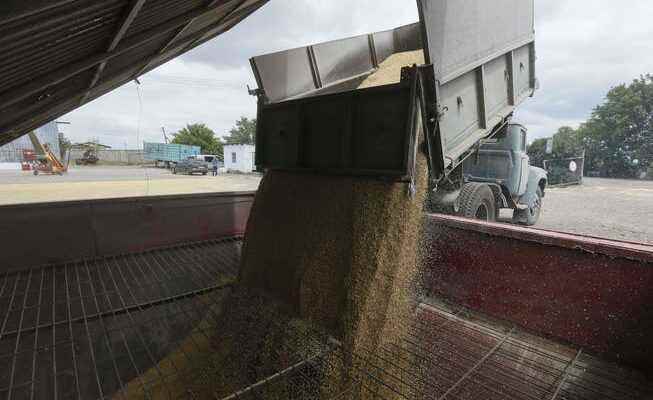Representatives of Kyiv and Moscow signed agreements in Istanbul to open the port of Odessa. They should make it possible to finally get the 20 million tons of grain out of the country that are stuck in the Ukrainian silos.
The new harvest is already being brought in in Ukraine. In order to make room for the grain, the silos urgently need to be emptied.
After months of negotiations, Kyiv and Moscow have agreed to resume Ukrainian grain exports. Ukraine’s Infrastructure Minister Olexander Kubrakov and Russia’s Defense Minister Sergei Shoigu signed in Istanbul on Friday an agreement with Turkey and the UN on the modalities for opening the Ukrainian ports. The ceremony took place in the presence of UN Secretary-General António Guterres and Turkish President Recep Tayyip Erdogan, whose government had played an important mediating role.
According to news agencies, the agreement provides for the resumption of shipping traffic from Odessa and the neighboring Black Sea ports of Yuzhne and Chornomorsk. A de facto ceasefire is to apply to the access routes and the three ports themselves. Ukrainian pilots are to steer the cargo ships out of the ports through a narrow corridor that is to be cleared of mines. The crew of the cargo ships will then take over at the border of Ukrainian territorial waters.
Under pressure from Moscow, the ships are to be checked by Turkish officials on their way out of the ports and on their way back to Ukraine in Istanbul. This is to ensure that Kyiv does not use the freighters to export goods other than grain or to import weapons. A control center is also to be set up in Istanbul, where representatives of Russia, Ukraine, Turkey and the UN will coordinate and monitor the operation.
Before the signing ceremony, the government in Kyiv emphasized that it was not signing an agreement with Russia, but was only committing itself to Turkey and the UN with the agreement. So Kubrakov and Shoigu signed two separate but identical papers. The agreement will initially be valid for four months and will be automatically renewed if the parties involved do not object.
There is a hunger crisis in North Africa
Guterres and Erdogan spoke of a “beacon of hope” on Friday. Internationally, the agreement was received with great relief. The resumption of Ukrainian grain exports is urgently needed to prevent a hunger crisis in the Middle East and North Africa. Bread prices have already risen dramatically in countries like Somalia, Yemen, Lebanon and Egypt, which are highly dependent on grain imports from Ukraine and Russia. Millions of people are at risk of starvation.
For months, Kyiv and Moscow have blamed each other for the situation. The Russians claimed that there was no naval blockade. Only the sea mines that the Ukrainians laid off their coasts to protect them from a Russian landing operation prevented the ports from being used. Ukraine, on the other hand, pointed out that it had to close its ports after the Russian Navy repeatedly shelled merchant ships at the beginning of the conflict.
In view of the dramatic consequences for the food situation in the world, the United Nations urged the ports to be opened quickly. Turkey, which controls access to the Black Sea as ruler of the Bosphorus and the Dardanelles and maintains good relations with both Kyiv and Moscow, acted as a mediator. The signing of the agreement is their biggest diplomatic success in the conflict so far.
Some questions are still open
Ukraine has been trying to find alternative export routes for months. However, exports by road and rail to ports in Poland and Romania are only possible to a limited extent. The capacity of the inland ports on the Danube is also limited. There is an urgent need to empty the silos to make room for the new crop. The opening of Odessa and the other ports alone should not completely solve the problem. Other Ukrainian ports are occupied by Russia or badly damaged.
It will probably be a few weeks before exports start. It is still unclear who will clear the Ukrainian sea mines off Odessa. According to media reports, a third country should take over, although this should not be Turkey. Much will depend on the good will of Moscow, which has various options to torpedo the agreement. Kyiv warned in advance that any provocation by Russia would result in an immediate military response.
preceded the agreement US statements and the EU clarifying that Russian grain and fertilizer exports are not affected by Western sanctions. The Kremlin had accused the West of impeding Russian agricultural exports with its sanctions. The EU and the USA, on the other hand, pointed out that food and other humanitarian goods were explicitly excluded. In fact, the sanctions against Russian banks, insurance companies and shipping companies had a negative impact on exports.
